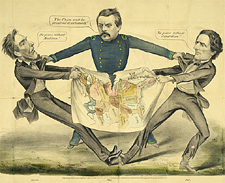
1864: The Civil War Election
The 1864 presidential campaign was bitter. The bloody conflict between North and South loomed over every aspect of American life. The electorate was so divided that some argued the election should be postponed until the war was over. Ultimately, however, the election proceeded as scheduled.
President Abraham Lincoln’s candidacy was widely contested, and his bid for re-election was seriously challenged from within his own party. In an effort to appeal to more Democratic Party supporters, Lincoln’s Republican Party renamed itself the National Union Party. At the same time, a Republican fringe group demanding a stronger position against slavery split off to form the “Radical Democracy” party and nominated John C. Frémont as their candidate. Frémont supported combat without compromise, believed that Congress should strictly control Southern reconstruction efforts, and urged the confiscation of Confederate property.
The Democrats nominated General George B. McClellan, whose campaign was less divisive. His platform called for whatever compromises were necessary to end the war and restore the Union. Although criticized for military losses and dogged by controversy over the Emancipation Proclamation, Lincoln successfully secured the nomination for President on the National Union ticket. Despite internal Party conflicts, Republicans rallied around a platform that supported restoration of the Union and the abolition of slavery. By the time of the election, several victories on the battlefield had turned the tide of war in the Union’s favor, influencing the electorate. Lincoln was re-elected with fifty-five percent of the popular vote and 212 of the 234 electoral votes.